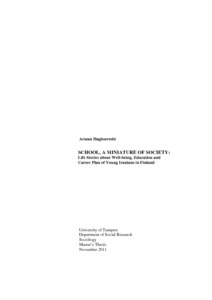School, a Miniature of Society: Life Stories about Well-being, Education and Career Plan of Young Iranians in Finland
HAGHSERESHT, ARMAN (2011)
HAGHSERESHT, ARMAN
2011
Sosiologia - Sociology
Yhteiskunta- ja kulttuuritieteiden yksikkö - School of Social Sciences and Humanities
This publication is copyrighted. You may download, display and print it for Your own personal use. Commercial use is prohibited.
Hyväksymispäivämäärä
2011-12-13
Julkaisun pysyvä osoite on
https://urn.fi/urn:nbn:fi:uta-1-22008
https://urn.fi/urn:nbn:fi:uta-1-22008
Tiivistelmä
This thesis examines the role of the Finnish education system in education and career plan of young Iranians with refugee background in Finland. Since the influential factors that affect their education and education plans are similar to other young immigrants in Finland, it indirectly involves the future education and career of many thousand potential fresh labour forces in Finland.
The goal is to realise the influence of education system and school experiences on life, and education and career plan of the participants. The analysis of the data aims at answering: 1) How the participants evaluate their education in Finland through their life stories? And why do they so? 2) What is the place of the Finnish education system, including the schools, in the life stories of the participants? And why is it so? 3) How the participants justify their education and career choices in relation to Finnish schools? And why is it so? The new elements of this study are its uniqueness in Finland in terms of topic, target group, and researcher as an ethnic insider.
Multiple theories on education and career of ethnic minorities influence the study. The theoretical standpoints are acculturation, transnational migration, and narrative explanations. The data is composed of narratives about participants’ lives with especial attention to their school experiences. It employs qualitative research methodology. Face to face interview by use of open-ended questionnaire and active interviewing, and participant observation are the main methods of collecting data. It applies narrative method for analysis and presenting the data.
The main results confirm significant failures in education and education plan of the participants. The shortcomings of the education system and school played important role in the failures, mainly by inability to provide a place to belong, lack of professionalism in dealing with immigrant students and motivating them. Thus, there are lack of interest in higher education and related jobs, and interest in emigrating from Finland. However, individual agency and supportive role model produce interest in higher education. To conclude, since the participants and their social capital of family, relatives, and friends do not hold a strong position in controlling participants’ lives, the role of school is the most influential in producing interest in higher education and related career.
Key words: education, career, plan, young, Iranian, refugee, narrative, story, well-being, Finland, acculturation, belonging, transnational migration.
The goal is to realise the influence of education system and school experiences on life, and education and career plan of the participants. The analysis of the data aims at answering: 1) How the participants evaluate their education in Finland through their life stories? And why do they so? 2) What is the place of the Finnish education system, including the schools, in the life stories of the participants? And why is it so? 3) How the participants justify their education and career choices in relation to Finnish schools? And why is it so? The new elements of this study are its uniqueness in Finland in terms of topic, target group, and researcher as an ethnic insider.
Multiple theories on education and career of ethnic minorities influence the study. The theoretical standpoints are acculturation, transnational migration, and narrative explanations. The data is composed of narratives about participants’ lives with especial attention to their school experiences. It employs qualitative research methodology. Face to face interview by use of open-ended questionnaire and active interviewing, and participant observation are the main methods of collecting data. It applies narrative method for analysis and presenting the data.
The main results confirm significant failures in education and education plan of the participants. The shortcomings of the education system and school played important role in the failures, mainly by inability to provide a place to belong, lack of professionalism in dealing with immigrant students and motivating them. Thus, there are lack of interest in higher education and related jobs, and interest in emigrating from Finland. However, individual agency and supportive role model produce interest in higher education. To conclude, since the participants and their social capital of family, relatives, and friends do not hold a strong position in controlling participants’ lives, the role of school is the most influential in producing interest in higher education and related career.
Key words: education, career, plan, young, Iranian, refugee, narrative, story, well-being, Finland, acculturation, belonging, transnational migration.
